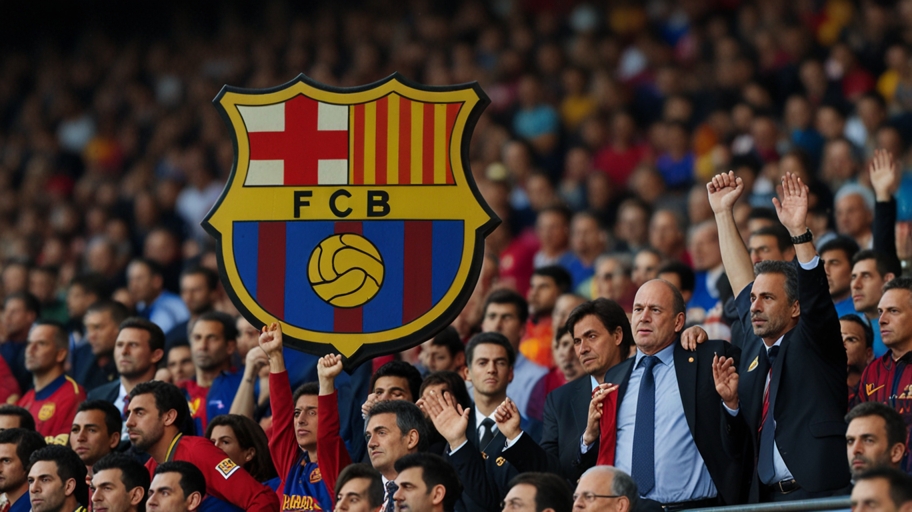In a significant development that has sent shockwaves through the sporting world, Barcelona Football Club is facing a severe financial setback after La Liga lowered the club’s wage cap. This decision came after the league determined that the club’s recently revised accounts do not align with the end-of-year figures provided by its previous auditor.
The controversy centers around a €100 million transaction related to the sale of premium seats in the refurbished Camp Nou. This transaction had initially enabled Barcelona to comply with LaLiga’s Financial Fair Play regulations and facilitated the registrations of players Dani Olmo and Pau Victor.
According to LaLiga’s announcement, the organization plans to file a complaint against the previous auditors who approved Barcelona’s accounts. The club has gone through three different auditing firms in just three months, raising serious questions about its financial management and transparency.
The new auditors from Crowe Spain determined that the full €100 million should not be recognized in this season’s financial results. They argued that the asset—new VIP seats—has yet to materialize and therefore cannot currently be considered as revenue for the club.
Based on its assessments, La Liga has concluded that Barcelona lacks the financial capacity to register Olmo and Victor. This determination directly contradicts the club’s previous assertions that these players were properly registered in compliance with all requirements stipulated by both RFEF and LaLiga.
The club’s president responded to LaLiga’s announcement during a press conference ahead of a Copa del Rey semi-final match against Atletico Madrid. He characterized the league’s communication as an attempt to damage the club’s reputation and undermine its interests.
The president further stated that the club would respond through its legal team, which is thoroughly evaluating LaLiga’s correspondence. He emphasized that the registrations of Olmo and Victor were conducted correctly, fulfilling all requirements stipulated by the relevant authorities.
Barcelona has struggled in recent years to meet La Liga’s Financial Fair Play standards. The club secured the signings of Olmo and Victor during the summer transfer window, but due to its inability to satisfy the salary cap, the players were initially registered only for the first half of the season.
Both LaLiga and the Spanish Football Federation initially prevented the extension of the two players’ registrations for the latter half of the 2024-25 season before the December 31 registration deadline. This created a significant challenge for the club’s competitive ambitions.
In January, the club announced an agreement with investors from the Middle East to sell VIP boxes, believing that this, combined with a new seven-year partnership with Nike, would stabilize their finances and enable compliance with Financial Fair Play regulations.
However, La Liga and the Spanish Football Federation disagreed with this assessment. They maintained that those agreements would only take effect after the December 31 deadline, leading to the revocation of the players’ licenses.
After two courts denied the club’s requests to register the players, the organization sought assistance from the Spanish government, prompting intervention from the National Sports Council. The Council supported the club’s appeal, permitting the provisional registration of the two players.
The provisional arrangement allowing Olmo and Victor to participate will conclude on Monday, when a final decision is expected from Spanish authorities. This timeline creates significant uncertainty for the club as it pursues success across multiple competitions.
The club currently leads La Liga, has reached the quarter-finals of the Champions League, and is set to play the second leg of their Copa del Rey semi-final. During this period of provisional registration, Olmo has participated in twelve matches across all competitions, while Victor has made three appearances.
According to LaLiga’s official statement, the club reported three different auditors within three months, with two of them failing to include the VIP seating sale in their submissions to the league. This inconsistency has raised serious concerns about the club’s financial reporting practices.
The first auditor, who represented the club until December 31, submitted an interim financial statement that did not reference the VIP seating sale. A second auditor was briefly engaged for a four-day period and provided certification regarding the transaction before a third firm took over.
LaLiga contends that the interim financial statement submitted by the first auditor indicated that the club did not possess any positive balance or registration capacity to register the two players in question. This directly contradicts the certification provided by the second auditor.
The league has informed the club that their salary cap has been reduced by the amount associated with the VIP seating sale, based on the interim financial statement provided. This reduction significantly impacts the club’s ability to manage its player roster and financial obligations.
This financial crisis comes at a particularly challenging time for the club, which has been working to rebuild its competitive standing while simultaneously addressing long-standing financial difficulties. The resolution of this dispute will have far-reaching implications for the club’s future.
The situation highlights the complex intersection of sports, business, and regulatory compliance in modern football. It also underscores the challenges faced by historic clubs as they navigate financial regulations while attempting to maintain their competitive edge in an increasingly demanding environment.
As the Monday deadline approaches, all eyes will be on the Spanish authorities as they prepare to render a final decision on this contentious matter. The outcome will not only affect the club’s immediate sporting prospects but could also establish important precedents for financial governance in professional football.
